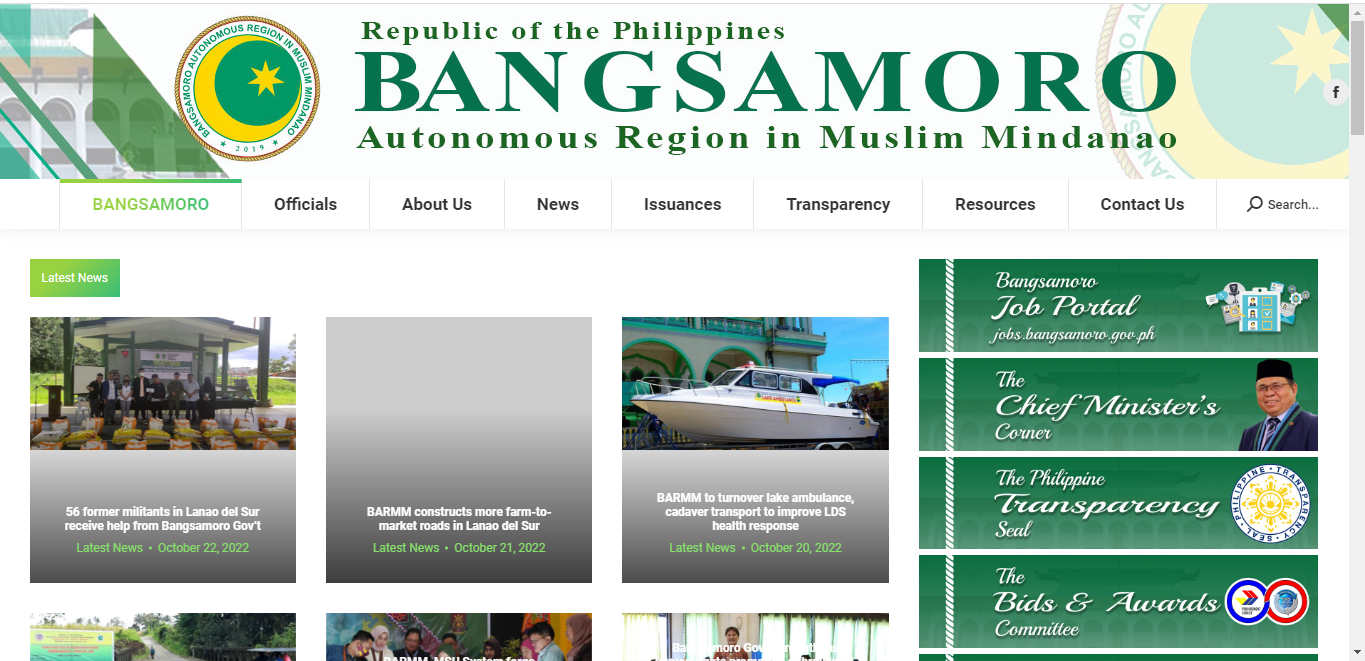 Digital Bangsamoro Portal
One-stop solutions portal for providing digital services to government organizations in the Philippines
Digital Bangsamoro Portal
One-stop solutions portal for providing digital services to government organizations in the Philippines

Challenges
The Bangsamoro Autonomous Region of Muslim Mindanao (BARMM) was established in March 2019 when a half-century of Moro separatist conflict in southern Philippines ended. Due to the long-lasting conflict, the Bangsamoro Region has become the least developed area in the country, and poverty is twice as high as the national average (ACAPS, (2022, March 8) Republic Act). During the conflict, government services were relatively inaccessible for the vast majority of people. Vulnerable groups such as poverty-stricken people, women and children, ethnic minorities, and people with disabilities, in particular, faced exclusion.
Governments in other countries have been using digital platforms to offer a variety of public services. Coupled with the discrepancies in digital literacy among the population and civil servants, however, decentralization makes it hard for both the users and the government to keep track of various applications on different platforms. It also creates challenges related to accountability and transparency.
Towards a Solution
In order to tackle the challenges of ensuring public service delivery in the region, the United Nations Development Programme (UNDP) in the Philippines agreed to support a set of capacity development activities for the Bangsamoro Transition Authority. A core part of UNDP’s support is in strengthening local government institutions, including through the development of a Local Government Code. The Local Government Code transfers the control and responsibility of delivering basic services to the hands of local government units (LGU). It aimed to enhance the provision of services at the grassroots level as well as improve the efficiency in resource allocation. To inform and guide UNDP’s support, an agreement was reached with the BARMM Ministry for the Interior and Local Government (MILG) to learn from the extensive experience of the UNDP-supported Aspire to Innovate (a2i) Programme, the flagship programme of the Digital Bangladesh agenda implemented by the Government of Bangladesh.
Under the facilitation of the South-South Network for Public Service Innovation (SSN4PSI), a team of experts from a2i visited BARMM in 2019 on a pre-feasibility mission. The mission highlighted the following objectives:
- Identifying the potential areas of risk in BARMM
- Understanding the basic readiness for the transformations
- Understanding the local context of BARMM
The a2i team from Bangladesh facilitated several workshops and meetings with various Ministries/Departments of the Philippines. One of the major goals of the workshops was to facilitate knowledge sharing for the government employees and people of the society and to share the insights obtained from the practical implementation of public service innovations in Bangladesh. A number of field visits were also conducted by the team. They visited several remote places to understand more about the citizens’ needs in order to better respond to solve the problems ensuring citizens’ satisfaction.
The response from various departments on using technology to deliver effective public service was astounding. Public services offered by BARMM Ministries were thoroughly analyzed and opportunities for digital innovations were explored from different perspectives of distinct individuals. The counterparts agreed to implement the “myGov one-stop solution platform” from Bangladesh to the BARMM region. The initiative was named the “Digital Bangsamoro Portal”.
The platform is a replicable model of the Government of People's Republic of Bangladesh’s successful initiative called myGov-one-stop solution service. The UNDP Philippines, in collaboration with the Ministry of Interior and Local Governance (MILG), adapted the platform with knowledge and technical support from the Aspire to Innovate (a2i) Programme. As there was no previous one-stop solution for government services, the new service brought immediate benefits to citizens. These included reducing the number of visits to access services thus saving time and costs. Under this initiative, a strong information and service delivery ecosystem has been established. The targets of this platform are to ensure accessibility, accountability, sustainability, scalability, and reliability of information and services from the government using their hand-held devices and accelerated user satisfaction.
Contact Information
Countries involved
Supported by
Implementing Entities
Project Status
Project Period
URL of the practice
Primary SDG
Primary SDG Targets
Secondary SDGs
Secondary SDG Targets
Similar Solutions
| NAME OF SOLUTION | Countries | SDG | Project Status | |
|---|---|---|---|---|
360-Degree Awareness Tool to Fight COVID-19 Raising awareness and ensuring public wellbeing through a one-stop platform for fighting COVID-19 in Bangladesh |
Bangladesh, Philippines | 16 - Peace and Justice Strong Institutions | Ongoing | View Details |
A Billion Brains: Smarter Children, Healthier Economies High Level Meeting on South-South Cooperation for Child Rights |
Bangladesh, Philippines | 17 - Partnerships for the Goals | Completed | View Details |
A-Card Initiative |
Bangladesh, Philippines | 10 - Reduced Inequalities | Completed | View Details |
Accelerating Digital Transformation in All Ministries in Bangladesh Promoting the rapid design and implementation of plans to digitize all ministries and subordinate government institutions in Bangladesh |
Bangladesh, Philippines | 10 - Reduced Inequalities | Ongoing | View Details |
Accelerating the Implementation of African Union Treaties in São Tomé and Príncipe South-South learning from the Beninese judicial system’s experience in the application of human rights treaties to its national law |
Bangladesh, Philippines | 05 - Gender Equality | Completed | View Details |
